- Home
- Michael Bond
Monsieur Pamplemousse on the Spot Page 2
Monsieur Pamplemousse on the Spot Read online
Page 2
On his way out he passed two more tables whose occupants were having to make a fresh decision over the last course, just as he had done. They didn’t look best pleased either. The maître d’hôtel probably wouldn’t thank him if he paused and recommended the framboises – even though they were probably the best he’d ever tasted. They would need all their supplies that evening. To have one dish off was bad enough. To run out of a second would be little short of disaster.
In the foyer he looked for a public telephone booth. It wouldn’t do to use the telephone in his room and risk being overheard – not until he knew what it was all about. Despite the fact that it was an automatic dial-out system, he had an old-fashioned mistrust of hotel telephones.
He emptied his change on to a shelf, fed some coins into the machine and dialled his office number. It was answered on the first ring.
‘Ah, Monsieur Pamplemousse.’ It was a voice he didn’t recognise. Normally he didn’t have much contact with the night shift. ‘Monsieur le Directeur is expecting you. Un moment.’
The Director was even quicker off the mark than the switchboard girl. He must have been sitting with his hand permanently on the receiver.
‘Pamplemousse? Are you all right? What kept you?’
‘I’m afraid the café was a little slow in arriving, Monsieur.’
‘Café! There was a noise like a minor explosion at the other end. ‘You stopped for café?’
‘Oui, Monsieur le Directeur.’ Monsieur Pamplemousse decided he must proceed with care. The tone was not friendly. ‘In view of the gravity of your message I felt it wise not to arouse suspicions by leaving my table with too great a haste.’
‘Ah!’ The response was a mixture of emotions, of incredulity and suspicion giving way, albeit with a certain amount of reluctance, to grudging respect. ‘Good thinking, Pamplemousse. Good thinking.’
Monsieur Pamplemousse breathed a sigh of relief. It was often a case of thinking on one’s feet with the Director. Like a boxer, you needed constantly to anticipate.
‘How was your meal?’ From the tone of the other’s voice it was clear he regarded the answer as a foregone conclusion. Not for the first time Monsieur Pamplemousse found himself marvelling at the efficiency of Le Guide. He wondered how the news from Les Cinq Parfaits had got through so quickly. It was almost uncanny at times. He had a mental picture of the Operations Room; the illuminated wall-map, the large table in the centre of the room with its little flags to represent the Inspectors. The girls with their long sticks moving them around. The shaded lights. The staff talking in hushed voices as the reports came in. However, tonight was no normal night.
‘It left a lot to be desired, Monsieur. Particularly towards the end.’
‘This is a disaster, Aristide. A disaster of the first magnitude.’
‘It was not good news, Monsieur,’ Monsieur Pamplemousse replied carefully, picking his way through the minefield of the Director’s mind. ‘It was not good news at all. As you can imagine, I had been looking forward to it. Perhaps,’ he tried to strike a cheerful note, ‘perhaps it only goes to show that nothing in this world can ever be wholly perfect.’ Encouraged by the silence at the other end, Monsieur Pamplemousse began to enlarge on this theme. The Director was in an overwrought state. He had probably been working too hard. He needed soothing. ‘One soufflé doesn’t make a summer, Monsieur. There will be others.’
There was a long pause. ‘Have you been drinking, Pamplemousse?’
‘Drinking, Monsieur? I had an apéritif before the meal – a Kir – followed by a glass or two of Sancerre with the Omble, then a modest Côte Rôtie, a glass of Beaumes-de-Venise with the sweet. I forewent a liqueur …’
‘Do you know why I sent you a telex?’
‘Because of the Soufflé Surprise, Monsieur?’
‘No, Pamplemousse.’ The voice at the other end reminded him suddenly of a dog barking. ‘It was not because of the Soufflé Surprise.’ There was another pause, a longer one this time. ‘And then again, yes, you are quite right. It was because of the Soufflé Surprise.’
Monsieur Pamplemousse decided to stay silent. Clearly he had, albeit unwittingly, scored some kind of point. Bonus points in fact. Throwing caution to the wind he edged the door to the telephone booth open a little with his foot. The heat inside was adding to the confusion in his mind. The Director’s voice when he spoke again was tinged with a new respect.
‘Your time with the Sûreté was not wasted, Aristide.’
‘Merci, Monsieur. I like to think not.’
‘You have a knack of going straight to the heart of the problem. Clearing a pathway through the jungle. It is indeed fortunate that we chose to send you to Les Cinq Parfaits at this moment in time. Pamplemousse …’ The Director paused and Monsieur Pamplemousse instinctively braced himself for the next words. ‘Pamplemousse, if I were to ask you for your definition of the words “liquid gold”, what would it be?’
Feeling himself on safe ground at long last, Monsieur Pamplemousse didn’t hesitate. ‘It would be a Sauternes, Monsieur. A Château d’Yquem. Probably the ’45. I am told that the ’28 and the ’37, although still wonderful, are now sadly past their best. In ’45 there was an early harvest …’
‘Aristide.’ There was a hint of pleading in the Director’s voice, as if he was trying to convey some kind of message. ‘Aristide, I have to tell you that this is a very serious matter. Think again.’
Monsieur Pamplemousse considered the matter for a moment. He wondered if the Director was trying to catch him out. Perhaps he was thinking of a German Eiswein – the capital made out of what in other circumstances, other areas, would have been a disaster; wine made from juice which had been squeezed from grapes frozen on the vine. That could be called liquid gold indeed. He racked his brains as he tried to think of famous years when it had happened.
‘Am I getting warm, Monsieur?’
‘No, Pamplemousse.’ There was an audible sigh from the other end. ‘You are not getting warm. You are cold. But your temperature at this moment is nothing compared to what it will be if this problem remains unsolved. Then you will be very cold indeed. We shall all be very cold.’
‘I have heard that the owner of Château d’Yquem holds the ’67 in high regard …’
‘Pamplemousse! Will you please stop talking about wine. It has nothing to do with wine.’ Monsieur Pamplemousse fell silent as the Director’s voice cut across his musings. He recognised a warning note and like a professional gambler studying the tables he decided to watch play for a while so that he could get the feel of how the numbers were running before making his next move. A moment later the wisdom of his decision was confirmed. The Director was off on another tangent.
‘Do you remember the winter of ’47, Pamplemousse?’
‘It was a very cold winter, Monsieur. I was only nineteen and it was my first time away from home. I was in Paris and I remember shivering in my room and wishing I was back in the Auvergne; at least they had wood to burn there. Food was scarce and there was ice on the inside of my bedroom window.’
‘There may well be ice on the inside of your bedroom window again next year, Pamplemousse, if you do not act quickly. Quickly and precisely and with the utmost discretion.
‘Listen to me and listen carefully. Walls have ears as you well know, and I do not wish to repeat what I have to say.
‘In four days’ time you will see a red carpet being laid out on the steps of Les Cinq Parfaits, a red carpet which will stretch all the way from the entrance doors to the helicopter landing-pad at the side of the building. It is a red carpet which in its time has felt the tread of a reigning monarch of Grande-Bretagne and more than one President of the French Republic. Latterly its pile has been compressed almost beyond recovery by the weight of a man of such unbelievable wealth it is impossible to describe; a grosse légume who by the blessing of Allah has the good fortune to be sitting on one of the richest deposits of oil in the world.
‘Each year he visits Les Cinq Parf
aits as a guest of France to carry out what one might call a “shopping expedition” and at the same time indulge himself on all that is best and richest and creamiest on the menu. He is particularly partial to the Soufflé Surprise.’
Monsieur Pamplemousse decided to take the bull by the horns.
‘With respect, Monsieur, I understand perfectly all that you are saying. What you are saying is that this V.I.P. – this grosse légume as you call him – being a guest of France, a guest of some importance to our future well-being, has to be cosseted and indulged and made to feel at home while he is here. That I understand, even if I do not necessarily approve. What I do not understand is how it affects my own stay at Les Cinq Parfaits.’
‘Because, Aristide, you are not at this moment staying at Les Cinq Parfaits. You may think you are, but you are not. To all intents and purposes you are staying at Les Quatre Parfaits. They are a Parfait short. One of the brothers – Jean-Claude – the one who is responsible for the soufflé in question, has vanished. Vanished without warning and without trace.’
‘That is bad news, Monsieur, I agree … but surely it is a matter for the local police …’
‘No, Pamplemousse, it is not a matter for the local police. The local police must be kept out of it at all costs. There are wheels, Pamplemousse, and within those wheels there are other wheels, and within those wheels there are yet more wheels. They must all be kept oiled. Without the continuing goodwill of this grosse légume – and I must tell you that the speed with which he has acquired his untold wealth has not so far been matched by any show of finer feelings towards his fellow man, rather the reverse – oil will be in very short supply. It may well be diverted towards colder climes than ours.’
‘But surely, Monsieur, if this … this person has to go without his Soufflé Surprise it is not the end of the world? Surely some other member of the staff could make one? One of the other brothers? Or if not, someone could be brought in. Girardet, perhaps? He is nearby.’
‘Aristide, would you have asked Titian to paint a Monet, or Picasso a Renoir? We are dealing with the creation of a genius.’
Monsieur Pamplemousse fell silent. The Director was right, of course. They were dealing with the product of an artist at the very pinnacle of his profession. Such things were beyond duplication.
‘Pamplemousse!’ The Director’s voice broke into his thoughts again. ‘When I say it is a serious matter, I mean it is a very serious matter. Who knows where it will end up? Each of the brothers is a specialist in his own right. Today there is no Soufflé Surprise. Tomorrow it could be the Omble. The day after, the Ris de veau aux salsifis. It is a matter that is exercising the minds of certain people at the highest levels of government. In particular of a “certain person” whose name I am not at liberty to divulge for reasons of security …’
‘A certain person,’ ventured Monsieur Pamplemousse, determined not to be outdone, ‘not a million miles away.’
‘No, Pamplemousse.’ The Director appeared to be having trouble with his breathing again. ‘A “certain person” who happens to be not two feet away from me at this very moment. Furthermore, he wishes to speak to you.’
Despite himself, Monsieur Pamplemousse stiffened as a second voice came over the phone, clear and incisive; a voice he recognised. A voice which until that moment he had only heard over the radio or on television.
‘Oui, Monsieur.’ His own voice, by comparison, sounded far away.
‘Oui, Monsieur. I understand, Monsieur.
‘It is a very great honour, Monsieur.
‘Without question, Monsieur.’
‘Now do you understand the gravity of the situation, Pamplemousse?’ It was the Director again, revitalised, and showing scarcely less authority than the previous speaker. Now the voice was that of a man with a mission. The voice, Monsieur Pamplemousse couldn’t help but reflect, of a man who sensed the whiff of a possible decoration somewhere close at hand. An Order of Merit, perhaps, or membership of the Légion d’Honneur?
‘From now on you will only communicate directly with this office. The telephone will be manned day and night. The codename of your mission will be “Operation Soufflé”. I have already spoken to Monsieur Albert Parfait. He has been instructed to render every assistance. If you require anything else, name it and it shall be yours. Otherwise, I suggest we keep conversation to a minimum.’
‘Oui, Monsieur.’
‘And Aristide …’ The Director’s voice softened for a moment. ‘If … no, not if – when our mission has been brought to a successful conclusion, you may order a bottle of Château d’Yquem … the ’45. I will see matters right with Madame Grante in Accounts. Your P39s will not be delayed. Au revoir, et bonne chance.’
‘Au revoir, Monsieur.’
Monsieur Pamplemousse replaced the receiver and then stood for a few seconds lost in thought. So much for a quiet week at Les Cinq Parfaits. It was a good thing Doucette hadn’t come with him as had at first been suggested. She would not have been pleased.
Gathering up the rest of his change, he pushed open the door, glancing around as he did so. He felt as though he had been inside the booth for hours and yet it could only have been a matter of minutes. Inside the restaurant itself the scene was as he had left it, the soft lights, waiters gliding to and fro, a steady hum of conversation. If only they knew what currents were developing around them.
As he crossed the entrance hall the commissionaire looked at him enquiringly and then stepped to one side. The glass doors slid quietly open for him as he drew near.
Outside the air was cool. It had a crisp feel to it; a hint of autumn. Floodlights concealed in a low wall gave a translucent glow to a bed of late-flowering roses. Nearby a fountain changed from red to green. The swimming pool beyond was deserted. Of Pommes Frites there was still no sign.
He took a silent dog-whistle from an inside pocket, placed it to his lips and blew hard several times. The result was most satisfactory. From somewhere behind the hotel pandemonium broke out; a collection of barks and howls and shrieks that would have brought a smile of satisfaction to the face of any members of the local kennel club. The shrill yelps of Papillons and Pekingese mingled with Beagles and Spaniels and did battle with Pomeranians. He recognised an Airedale or two and what sounded like a Labrador, but conspicuous by its absence was the deeper, full-throated baying of a Bloodhound answering his master’s call.
It proved several things at one and the same time. The whistle was working – something he had never been totally sure about ever since he’d first bought it. It also proved that, temporarily at least, Pommes Frites was not in residence. Perhaps his huff was deeper than he’d feared, or else he’d gone off for some other reason best known to himself.
Monsieur Pamplemousse gazed gloomily at the shrubbery, hoping it might suddenly part to reveal his friend and mentor, but parting came there none.
With a heavy heart and a sense of foreboding he replaced the whistle in his pocket and, Watsonless, turned to go back inside the restaurant.
2
STRANGER IN THE NIGHT
Leaning heavily on a stick, Albert Parfait rose to his feet, pushed a large, plain bottle full of colourless liquid across his desk, then hovered uneasily as he tried to regain his balance. Unlike the bottle, which was considerably wider at the bottom that it was at the top, weight distribution was not on his side and for a moment or two it looked as though he might topple over backwards into his chair again.
Monsieur Pamplemousse resisted the temptation to go to his aid. Having been born and brought up in the Auvergne, he recognised the independence of one who also came from a mountainous region.
His restraint didn’t go unrewarded. At long last Monsieur Parfait relaxed and waved his stick in a triumphant gesture which managed to embrace at one and the same time his visitor, the shadowy figures beyond the darkened glass separating his office from the kitchen, and the bottle on the table in front of him.
‘Encore!’
Monsieur Pamplemo
usse obeyed with alacrity. Ordinarily he was not a great lover of eau-de-vie. Given the choice he would have preferred an armagnac, but the opportunity to indulge himself with another Poire William was not one to be missed. The somewhat depressing telephone conversation with the Director had left him feeling in need of a ‘pick-me-up’.
The bottle emitted a satisfactory gurgle as he topped up his glass; the whole pear within remained tantalisingly encapsulated and unreachable. From the absence of any kind of a label he guessed Les Cinq Parfaits must make it themselves. It would be the job of the youngest recruit to slip the empty bottles over the fruit as it began to form in the late spring. Later in the year, when the pear itself was fully grown, someone else would be entrusted with the task of cutting down pear and bottle and adding the brandy. Later still, others like himself would be lucky enough to enjoy the benefit of their labours. There was a logical progression about the whole operation which appealed to his mathematical side. Truly life was not without its compensations. Just when things were looking black something unexpected happened to restore the balance. He was almost beginning to look forward to whatever fate had in store for him.
Settling back in his chair, he felt the warmth of the liquid rise up from within while he waited for his companion to speak again. The flourish of Monsieur Parfait’s stick conveyed a generosity of spirit which would have been hard to resist for fear of giving offence.
He glanced around the room. High up on the wall to his right there was a framed sepia photograph. It was the original of smaller, postcard-sized versions he’d seen on sale in the entrance hall, alongside pots of home-made confiture and signed copies of the menu; the almost obligatory current symbols of a successful restaurant.
The photograph was of a small group posing in front of a whitewashed stone building. One of the group, the only man in fact, was in a soldier’s uniform and from the way the others were dressed it must have been taken during the First World War, in the days when Les Cinq Parfaits had been known simply as Mère Parfait. Above their heads the words CAFÉ RESTAURANT were just visible, whilst to the right of a smallish window, a doorway with a bead curtain was all that separated the dining-room from the outside world.

 Paddington on Top
Paddington on Top Paddington Takes the Test
Paddington Takes the Test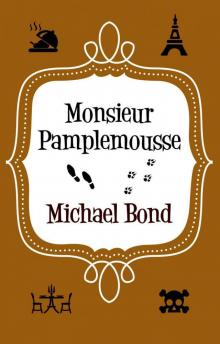 Monsieur Pamplemousse (Monsieur Pamplemousse Series)
Monsieur Pamplemousse (Monsieur Pamplemousse Series) Paddington Here and Now
Paddington Here and Now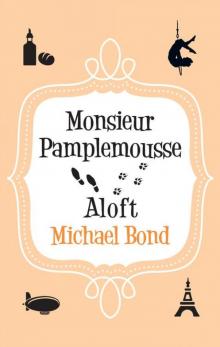 Monsieur Pamplemousse Aloft
Monsieur Pamplemousse Aloft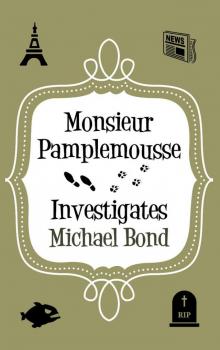 Monsieur Pamplemousse Investigates
Monsieur Pamplemousse Investigates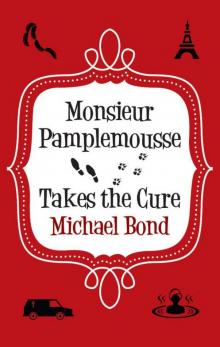 Monsieur Pamplemousse Takes the Cure
Monsieur Pamplemousse Takes the Cure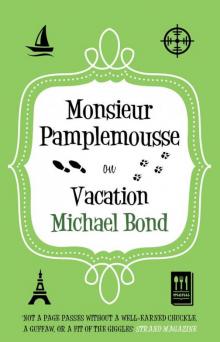 Monsieur Pamplemousse on Vacation
Monsieur Pamplemousse on Vacation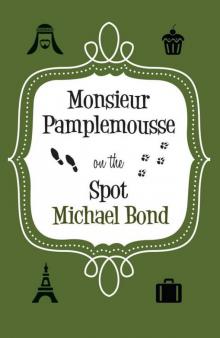 Monsieur Pamplemousse on the Spot
Monsieur Pamplemousse on the Spot Monsieur Pamplemousse Hits the Headlines
Monsieur Pamplemousse Hits the Headlines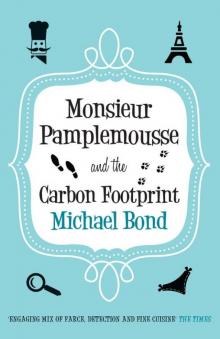 Monsieur Pamplemousse and the Carbon Footprint
Monsieur Pamplemousse and the Carbon Footprint Love from Paddington
Love from Paddington Paddington’s Finest Hour
Paddington’s Finest Hour Paddington Complete Novels
Paddington Complete Novels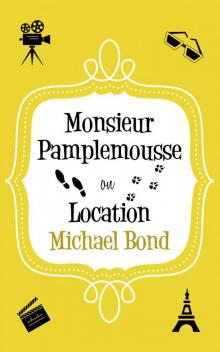 Monsieur Pamplemousse On Location
Monsieur Pamplemousse On Location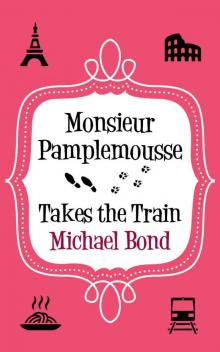 Monsieur Pamplemousse Takes the Train
Monsieur Pamplemousse Takes the Train It Wasn’t Me!
It Wasn’t Me! Paddington Races Ahead
Paddington Races Ahead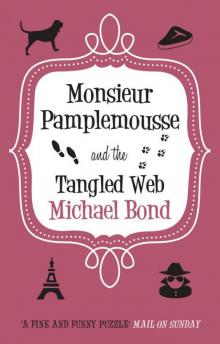 Monsieur Pamplemousse and the Tangled Web
Monsieur Pamplemousse and the Tangled Web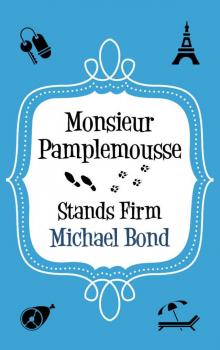 Monsieur Pamplemousse Stands Firm
Monsieur Pamplemousse Stands Firm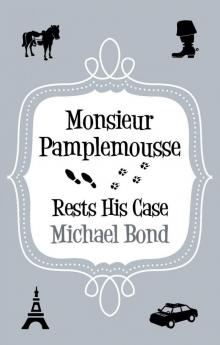 Monsieur Pamplemousse Rests His Case
Monsieur Pamplemousse Rests His Case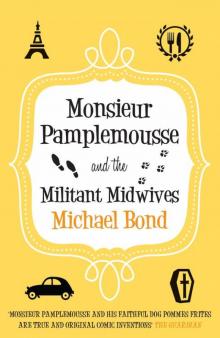 Monsieur Pamplemousse and the Militant Midwives
Monsieur Pamplemousse and the Militant Midwives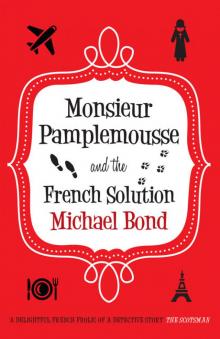 Monsieur Pamplemousse and the French Solution
Monsieur Pamplemousse and the French Solution Paddington Helps Out
Paddington Helps Out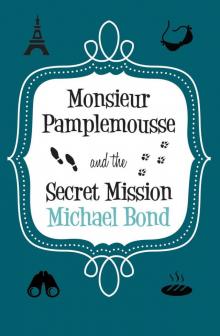 Monsieur Pamplemousse & the Secret Mission (Monsieur Pamplemousse Series)
Monsieur Pamplemousse & the Secret Mission (Monsieur Pamplemousse Series)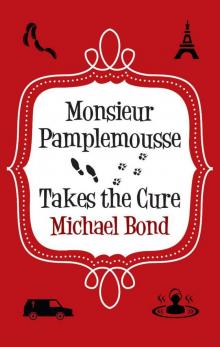 Monsieur Pamplemousse Takes the Cure (Monsieur Pamplemousse Series)
Monsieur Pamplemousse Takes the Cure (Monsieur Pamplemousse Series) A Bear Called Paddington
A Bear Called Paddington